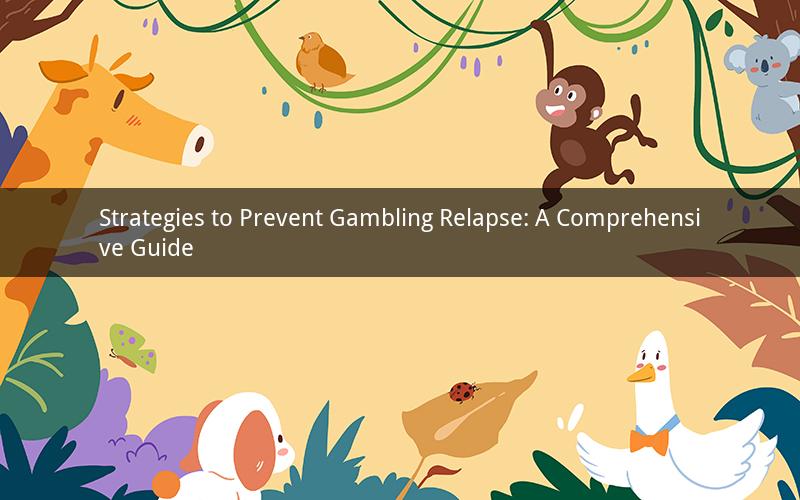
Gambling addiction is a challenging issue that affects countless individuals worldwide. It is crucial for those struggling with this problem to develop effective strategies to prevent gambling relapse. This guide will explore various techniques and approaches to help individuals maintain their recovery journey. By understanding the factors that trigger relapse and implementing appropriate prevention methods, individuals can increase their chances of long-term recovery.
1. Identify Triggers and High-Risk Situations
Understanding the triggers that lead to gambling relapse is essential for effective prevention. Triggers can be emotional, environmental, or social factors. Common triggers include financial difficulties, stress, loneliness, and exposure to gambling-related stimuli. By identifying these triggers, individuals can take proactive measures to avoid high-risk situations.
a. Emotional Triggers: Recognize the emotions that trigger gambling behavior, such as sadness, anger, or boredom. Develop healthy coping mechanisms, such as exercise, meditation, or engaging in hobbies, to deal with these emotions.
b. Environmental Triggers: Be aware of environments that may increase the temptation to gamble, such as casinos, bars, or social gatherings involving gambling. Create a support network of friends and family who understand your struggles and can help you avoid high-risk situations.
c. Social Triggers: Identify individuals who may encourage or enable your gambling behavior. Establish boundaries and communicate your needs clearly to maintain healthy relationships.
2. Strengthen Support Systems
Building a strong support system is crucial for preventing gambling relapse. Surround yourself with individuals who understand your recovery journey and are willing to provide support.
a. Professional Support: Seek help from mental health professionals, such as therapists or counselors, who specialize in gambling addiction. They can provide personalized guidance and treatment tailored to your specific needs.
b. Support Groups: Joining a support group, such as Gamblers Anonymous, can provide a sense of community and shared experiences. These groups offer valuable insights and coping strategies from individuals who have faced similar challenges.
c. Family and Friends: Communicate openly with your loved ones about your recovery journey. Encourage them to be actively involved in your support system and help you maintain accountability.
3. Develop Healthy Coping Mechanisms
Finding healthy coping mechanisms is essential for managing cravings and preventing relapse. Instead of turning to gambling, learn alternative ways to deal with stress, boredom, or other triggers.
a. Exercise: Engaging in regular physical activity can help reduce stress and improve your overall well-being. Consider activities such as walking, running, or yoga.
b. Mindfulness and Meditation: Practicing mindfulness and meditation can help you stay grounded and focused on your recovery journey. These techniques can also help you become more aware of your thoughts and emotions, allowing you to address them more effectively.
c. Hobbies and Interests: Find activities that you enjoy and can provide a sense of fulfillment and purpose. This could include reading, painting, cooking, or learning a new skill.
4. Establish Financial Boundaries
Financial problems often contribute to gambling relapse. Establishing financial boundaries can help you maintain control over your finances and reduce the temptation to gamble.
a. Create a Budget: Develop a realistic budget that includes necessary expenses, savings, and discretionary spending. Stick to this budget to ensure you have enough funds for your daily needs and avoid overspending.
b. Set Financial Goals: Set achievable financial goals that can provide you with a sense of accomplishment and motivation. This could include paying off debts, saving for a vacation, or investing in your future.
c. Avoid Access to Credit: Limit your access to credit cards and loans that may encourage gambling behavior. Consider seeking financial counseling to help you manage your debts and improve your financial situation.
5. Stay Committed to Your Recovery
Maintaining a commitment to your recovery journey is crucial for long-term success. Remind yourself of the reasons you started your recovery journey and the progress you have made.
a. Reflect on Your Progress: Regularly take time to reflect on your recovery journey and the positive changes you have made. Acknowledge your strengths and be proud of your achievements.
b. Stay Connected to Your Support System: Keep in touch with your support network, including friends, family, and professionals. Attend support group meetings regularly to stay motivated and connected.
c. Be Patient and Kind to Yourself: Understand that recovery is a continuous process with ups and downs. Be patient with yourself, and remember that setbacks do not define your progress.
By implementing these strategies and approaches, individuals can significantly reduce their risk of gambling relapse. Remember, recovery is a personal journey, and it is essential to find what works best for you. With determination, support, and the right tools, you can maintain a fulfilling life free from the grips of gambling addiction.
Questions:
1. What are the most common triggers that lead to gambling relapse?
Answer: The most common triggers include emotional factors like sadness or anger, environmental factors like being around gambling-related stimuli, and social factors like pressure from others to gamble.
2. How can joining a support group benefit someone struggling with gambling addiction?
Answer: Joining a support group can provide individuals with a sense of community, shared experiences, and valuable coping strategies from others who have faced similar challenges.
3. What are some healthy coping mechanisms for managing gambling cravings?
Answer: Healthy coping mechanisms include exercise, mindfulness and meditation, and engaging in hobbies or interests that provide fulfillment and a sense of purpose.
4. How can setting financial boundaries help prevent gambling relapse?
Answer: Setting financial boundaries helps by providing control over finances, reducing the temptation to gamble, and ensuring individuals have enough funds for their daily needs.
5. Why is it important to stay committed to the recovery journey?
Answer: Staying committed to the recovery journey helps maintain motivation, provides a sense of progress and accomplishment, and reminds individuals of the reasons they started their journey.